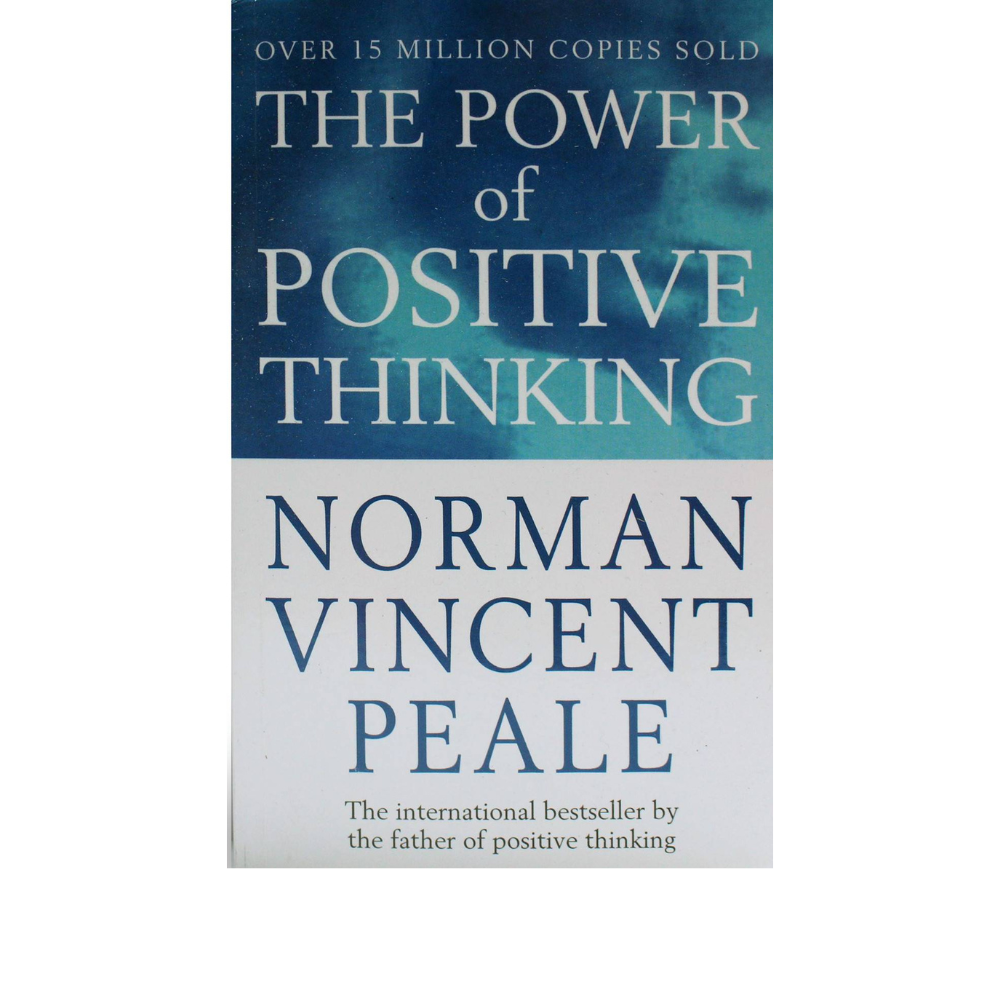The Power of Positive Thinking: A Practical Guide to Mastering the Problems of Everyday Living is a 1952 self-help book by American minister Norman Vincent Peale. It provides anecdotal “case histories” of positive thinking using a biblical approach and practical instructions to help the reader achieve a permanent and optimistic attitude. The writer claimed that these techniques and practices would give the reader higher satisfaction and quality of life.
HOW THIS BOOK HELPED US?
The Power Of Positive Thinking will show you that the roots of success lie in your mind and teach you how to believe in yourself, break the habit of worrying, and take control of your life by taking control of your thoughts and changing your attitude.
THE BOOK EXPLAINED UNDER 60 SECONDS
This book suggests techniques, approaches and examples which demonstrate that you do not need to be defeated by anything and that you can have peace of mind, improved health, and a never-ceasing flow of energy. In short, your life can be full of joy and satisfaction.
TOP THREE QUOTES
“Without a humble but reasonable confidence in your own powers, you cannot be successful or happy.”
“The greatest secret for eliminating the inferiority complex, which is another term for deep and profound self-doubt, is to fill your mind to overflowing with faith. Develop a tremendous faith in God, giving you a humble yet soundly realistic faith in yourself.”
“We are beginning to comprehend a basic truth hitherto neglected, that our physical condition is largely determined by our emotional condition, and our emotional life is profoundly regulated by our thought life.”
BOOK SUMMARIES AND NOTES

Chapter One: Believe in Yourself
Always believe in yourself and have faith in your abilities. You’ll only succeed or be happy if you have humble and reasonable confidence in your abilities. Feelings of inferiority and inadequacy interfere with achieving your wants and desires. But self-confidence leads to self-realisation and successful accomplishments. If you do not believe you’ll succeed in a particular task or job, then the training you receive and the experience you possess are useless. Self-confidence will assist you in creating the life you envision. But this requires moving from passive acceptance to an active change in your thinking, focusing on the positive, and believing you can overcome any obstacles. Visualisation is one method that can help. By imagining positive outcomes and comparing them to your perceived problems, blocks will appear more manageable. Feelings of confidence depend upon the type of thoughts that habitually occupy your mind. Think defeat, and you are bound to feel defeated. But practice thinking confident ideas, make it a dominating habit, and you will develop such a strong sense of capacity that regardless of difficulties, you can overcome them.
Favourite quote of the chapter: “Be bold, and mighty forces will come to your aid.”

Chapter Two: A Peaceful Mind Generates Power
A primary method for gaining a mind full of peace is to practice emptying the mind. The writer recommends mind-emptying at least twice daily, more often if necessary. Practice opening your mind to fears, hates, insecurities, regrets, and guilt. The mere fact that you consciously attempt to empty your mind tends to give relief. Having someone you trust enough to share your sorrows will always keep you and your mind at peace. Emptying the mind is not simply enough. When the mind is opened, something is bound to enter because the mind can’t stay empty. You must refill the emptied mind; otherwise, your unhappy thought will sneak in again. Immediately start filling your mind with creative and healthy ideas to prevent this from happening. Your mind will be busy when your fears and worries try to get back in. At intervals during the day, practice thinking a carefully selected series of peaceful thoughts. Another effective technique in developing a calm mind is the daily practice of silence.
Favourite quote of the chapter: “It is important to eliminate from conversations all negative ideas, for they tend to produce tension and annoyance inwardly.”

Chapter Three: How to Have Constant Energy
How we think and feel affects how we feel physically. Suppose your mind tells you that you are tired. In that case, your body mechanism and muscles will accept that as a fact. Hence if your mind is intensely interested in something, you will do that work with 100 per cent focus. The author says that religion functions through thoughts as a system of thought discipline. The author says that supplying an attitude of faith to the mind can increase energy. Hence always say positive things in your mind, and always try to be optimistic about your health and body. Many people are tired simply because they are not interested in anything. Nothing ever moves them deeply. To some people, what’s going on or how things go makes no difference. Their concerns are superior even to all crises in human history. Nothing makes any real difference to them except their little worries, desires, and hate.
Favourite quote of the chapter: “The surest way not to become tired is to lose yourself in something in which you have a profound conviction.”

Chapter Four: Try Prayer Power
You can only get a man physically healthy once you get him spiritually healthy. Experts in physical health and well-being often utilise prayer in their therapy. Disability, tension, and troubles can generate because of a lack of inner harmony, and prayer shows remarkable results in restoring the harmonious functioning of body and soul. You should also adopt prayer to open your mind to God. You can use any method that allows you to be free and open up your mind to God. Dr Norman states, “You are dealing with the tremendous power in the world when you pray.” People are doing more praying today than formerly because they find that it adds to personal efficiency. Prayer helps them to tap forces and to utilise strength not otherwise available.
Favourite quote of the chapter: “People are doing more praying today than formerly because they find that it adds to personal efficiency. Prayer helps them to tap forces and to utilise strength not otherwise available.”

Chapter Five: How to Create Your Own Happiness
You are the only one who decides whether you will be happy, and your thoughts determine your happiness. You, therefore, need to drive out the ideas that bring unhappiness and adopt happy thoughts. Children are more experts in satisfaction than adults because children choose happiness for themselves. They never allow negative energy to influence them. The adult who can carry the spirit of a child into middle and old age is a genius, for he will preserve the joyful spirit with which God endowed the young. A substantial proportion of the unhappiness of the average individual is self-manufactured. The way to happiness: keep your heart free from hate and your mind from worry. Love simply, expect little, and give much. Fill your life with love. Scatter sunshine. Forget self. Think of others. Do as you would be done. Try this for a week, and you will be surprised.
Favourite quote of the chapter: “Who decides whether you shall be happy or unhappy? The answer—you do!”

Chapter Six: Expect the best and get it
The writer has shared a story of a man whose son for failing in every job. It was pretty challenging to understand the reason behind that boy’s failure because he had everything, belonged to a good family, and his educational and business opportunities were beyond the average, but still, he was failing. Everything he touched went wrong, that man’s son tried hard, but still, he missed success, but later he found an answer for his failure, and after practising that answer, he started facing success. He acquired the touch of success, his personality began to focus, and his powers fused.
Favourite quote of the chapter: “Things become better when you expect the best instead of the worst, for the reason that being freed from self-doubt, you can put your whole self into your endeavour, and nothing can stand in the way of the man who focuses his entire self on a problem.”
HOW THIS BOOK CAN HELP SOFTWARE DEVELOPERS
Norman Vincent Peale’s “The Power of Positive Thinking” offers insights that can help software developers in several ways. The book emphasises the importance of developing a positive mindset, which is crucial for a software developer facing complex challenges daily. Positive thinking helps them to stay motivated, focused and find solutions to problems with a constructive approach. The book also advocates for the power of visualisation and the ability to see the result in your mind’s eye before it is achieved in reality. This approach can be beneficial for software developers who are trying to build complex systems, as it helps them to break down the project into smaller parts and work towards the end goal systematically. Overall, the book provides a valuable perspective for software developers to cultivate a positive mindset, develop a clear vision of their goals, and approach their work constructively.


